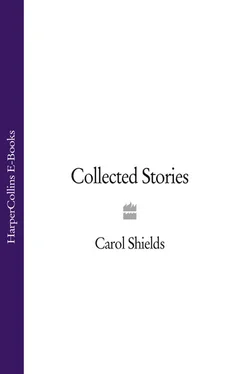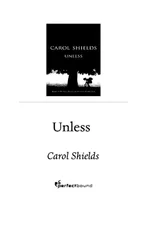The following day, having signed the release papers and made the arrangements to have his wife moved, Meershank, until then a faithful husband, took his editor, Maybelle Spritz, to a downtown hotel and made plodding love to her, afterward begging pardon for his age, his grief and his fury at the fresh-faced specialist who, concluding their interview, had produced one of Meershank’s books, Walloping Westward , and begged the favor of an inscription. Meershank coldly took out a pen and signed his name. He reminded himself that the Persians had routinely put to death the bearer of bad news.
Home again, with Louise installed in the big front bedroom, he resumed work. His word processor hummed like a hornet from nine to five, and the pages flew incriminatingly out of the printer. During the day his brain burned like a lightbulb screwed crookedly into a socket. At night he slept deeply. He wondered if he were acquiring a reputation for stoicism, that contemptible trait! Friends stopped by with gifts of food or flowers. The flowers he carried up to Louise’s bedroom, where they soon drooped and died, and the food he threw in the garbage. Coffee cakes, almond braids, banana loaves—his appetite had vanished.
“Eat,” Maybelle commanded, loading his plate.
He loved noodle pudding, and wondered how Maybelle knew. “It’s in your second novel,” she reminded him. “Snow Soup and Won Ton Drift . Remember? Wentzel goes into the café at Cannes and demands that—”
“I remember, I remember.” Meershank held up a hand. (He was always holding up a hand nowadays, resisting information.) He had a second helping, ingesting starch and sweetness. This was hardly fitting behavior for a grieving husband. He felt Maybelle’s eyes on him. “I shoulda brought more,” she said, sounding for a minute like a girl from Cookston Corners, which she was. “I said to myself, he’ll be starving himself.”
For dessert she rummaged in the refrigerator and found two peaches. Louise would have peeled them and arranged the slices in a cut glass bowl. Meershank and Maybelle sat eating them out of their hands. He thought to himself: this is like the last day of the world.
“Ripe,” Maybelle pronounced. There was a droplet of juice on her chin, which she brushed away with the back of her hand. Meershank observed that her eyes looked tired, but perhaps it was only the eye shadow she wore. What was the purpose of eye shadow, he wondered. He had never known and couldn’t begin to imagine.
A character in his first book, Swallowing Hole , had asked this question aloud to another character, who happened to be his wife. What was her name? Phyllis? Yes, Phyllis of the phyllo pastry and philandering nights. “Why do you smudge your gorgeous green eyes with gook?” he, the cockolded husband, had asked. And what had the fair Phyllis replied? Something arch, something unpardonable. Something enclosing a phallic pun. He had forgotten, and for that he blessed the twisted god of age. His early books with their low-altitude gag lines embarrassed him, and he tried hard to forget he had once been the idiot who wrote them.
Maybelle, on the other hand, knew his oeuvre with depressing thoroughness and could quote chapter and verse. Well, that was the function of an editor, he supposed. A reasonable man would be grateful for such attention. She was a good girl. He wished she’d find a husband so he would feel less often that she’d taken the veil on his account. But at least she didn’t expect him to converse with wit. Like all the others, she’d bought wholesale the myth of the sad jester.
It was a myth that he himself regarded with profound skepticism. He’d read the requisite scholarly articles, of course, and had even, hypocrite that he was, written one or two himself. Humor is a pocket pulled inside out; humor is an anguished face dumped upside down; humor is the refuge of the grunting cynic, the eros of the deprived lover, the breakfast of the starving clown. Some of these cheap theories he’d actually peddled aloud to the graduating class at Trent a year ago, and his remarks had been applauded lustily. (How much better to lust applaudingly, he’d cackled, sniggered, snorted inside his wicked head.)
He suspected that these theories were leapt upon for their simplicity, their symmetry, their neat-as-a-pin ironic shimmer. They were touted by those so facile they were unable to see how rich with ragged comedy the world really was. But Meershank knew, he knew! Was it not divinely comic that only yesterday he’d received a telephone solicitation from the Jackson Point Cancer Fund? Wasn’t it also comic that the specter of his wife’s death should fill him with a wobbly lust for his broad-busted, perfume-wafting, forty-year-old editor? For that matter, wasn’t it superbly comic that a man widely known as a professional misogynist had remained happily married to one woman for thirty-five years? (Life throws these kinky curves a little too often, Meershank had observed, and the only thing to do was open your fool mouth and guffaw.)
At nine he checked once again on his wife, who was sleeping quietly. If she woke later, a second injection was permitted. He carried a bottle of brandy out on to the veranda. One for the road?, he asked Maybelle with his eyebrows. Why not, she said with a lift of her shoulders. Her upper lip went stiff as a ledge in the moonlight, and he shuddered to think he was about to kiss her. The moon tonight was bloated and white, as fretful as a face. Everywhere there was the smell of mock orange blossoms, which had bloomed early this year and in absurd profusion. Crickets ticked in the grass, like fools, like drunkards. Meershank lifted his glass. The brandy burned his throat and made him retreat for an instant, but Maybelle became attenuated, lively, sharp of phrase, amusing. He laughed aloud for the first time in a week, wondering if the world would crack down the middle.
It did. Or seemed to. A loud overhead popping noise like the cracking of whips made him jump. Maybelle slammed down her glass and stared. All around them the sky flashed white, then pink, then filled with rat-a-tat-tat fountains and sparks and towering plumes.
“Jesus,” Maybelle said. “Victoria Day. I almost forgot.”
“I did forget,” Meershank said. “I never once thought.”
A rocket whined and popped, made ropy arcs across the sky, burst into petals, leaving first one, then a dozen blazing trails. It was suddenly daylight, fierce, then faded, then instantly replaced by a volley of cracking gunpowder and new showers of brilliance.
The explosions, star-shaped, convulsive, leaping out of the other, made Meershank think of the chains of malignant cells igniting in his wife’s body.
He set down his brandy, excused himself and hurried upstairs.
Meershank, marrying Louise Lovell in 1949, had felt himself rubbing bellies for the first time with the exotic. He, a Chicago Jew, the son of a bond salesman, had fallen in love with a gentile, a Canadian, a fair-haired girl of twenty who had been gently reared in the Ottawa Valley by parents who lived quietly in a limestone house that was a hundred years old. It faced on the river. There was a rose garden criss-crossed by gravel paths and surrounded by a pale pink brick wall. Oh, how silently those two parents had moved about in their large square rooms, in winter wrapping themselves in shawls, sitting before pots of raspberry-leaf tea and making their good-natured remarks about the weather, the books they were forever in the middle of, the tiny thunder of politics that flickered from their newspaper, always one day old.
The mother of Louise possessed a calm brow of marble. The father had small blue eyes and hard cheeks. He was the author of a history of the Canadian Navy. It was, he told Meershank, the official history. Meershank was given a signed copy. And he was given, too, with very little noise or trouble, the hand of Louise in marriage. He had been stunned. Effortlessly, it seemed, he’d won from them their beloved only daughter, a girl of soft hips and bland hair done roundly in a pageboy.
Читать дальше












